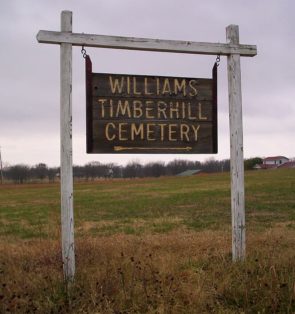Make Ma Happy. Enter to win a copy of the new book
Ma Barker: America’s Most Wanted Mother.

The cemetery where the Barkers are buried.
In a time when notorious Depression-era criminals were terrorizing the country, the Barker-Karpis Gang stole more money than mobsters John Dillinger, Vern Miller, and Bonnie and Clyde combined. Five of the most wanted thieves, murderers, and kidnappers by the Federal Bureau of Investigation (FBI) in the 1930s were from the same family. Authorities believed the woman behind the band of violent hoodlums that ravaged the Midwest was their mother, Kate “Ma” Barker.
The monument placed on Herman Barker’s grave was a massive, granite stone that stood more than four feet high. The deceased’s name was carved into the marble along with his date of birth and the date he died. In the beginning, Ma regularly visited the site near Welch, Oklahoma, bringing flowers and some of Herman’s belongings from when he was a boy. She laid his things neatly on the mound of dirt that covered his remains. Detective Harrison Moreland, a writer for the Master Detective magazine, reported that Ma “turned her back entirely on morality once Herman was gone.” There had been a time when she might have lied to George about their sons’ criminal activities or tried to dispel the rumors she was spending time with other men, but that all stopped when she saw Herman’s bullet-ridden body lying on a slab at the morgue.
George Barker had taken time away from his job at the filling station in Webb City, Missouri, to attend Herman’s funeral. Ma paid little attention to her estranged husband. Any comfort she needed during her time of grief was handled by the man who accompanied her to the cemetery, Arthur W. Dunlop, also known as George Anderson. Ma had met Arthur at a club in Tulsa. He had been a carpenter and painter for Sommers Sign System. Ma never let Arthur stray too far from her side; even when George approached her for what he hoped would be a private conversation about where the money for Herman’s headstone came from, Arthur was milling around close behind the pair.
Ma dismissed George’s question about the headstone but informed the timid, grieving man that Herman and their other boys regularly sent money home for her support. She gushed over how considerate the Barker boys were and cursed those who argued that her sons were anything less. “If the good people of this town don’t like my boys,” Ma was often heard saying, “then the good people know what to do.” George returned to Missouri with the full knowledge that he and his wife would never reconcile and that his sons could never be respectable citizens.
To learn more about Ma Barker and the Barker-Karpis Gang read
Ma Barker: America’s Most Wanted Mother.

